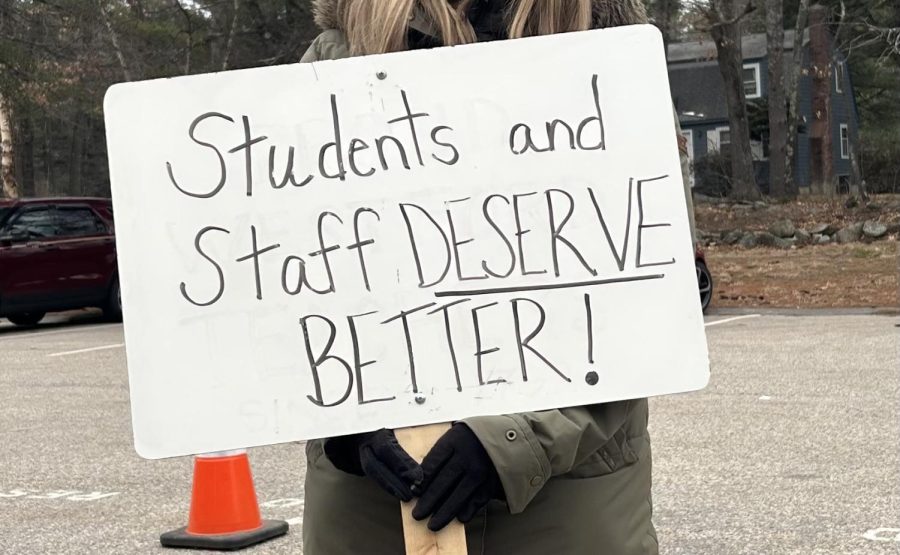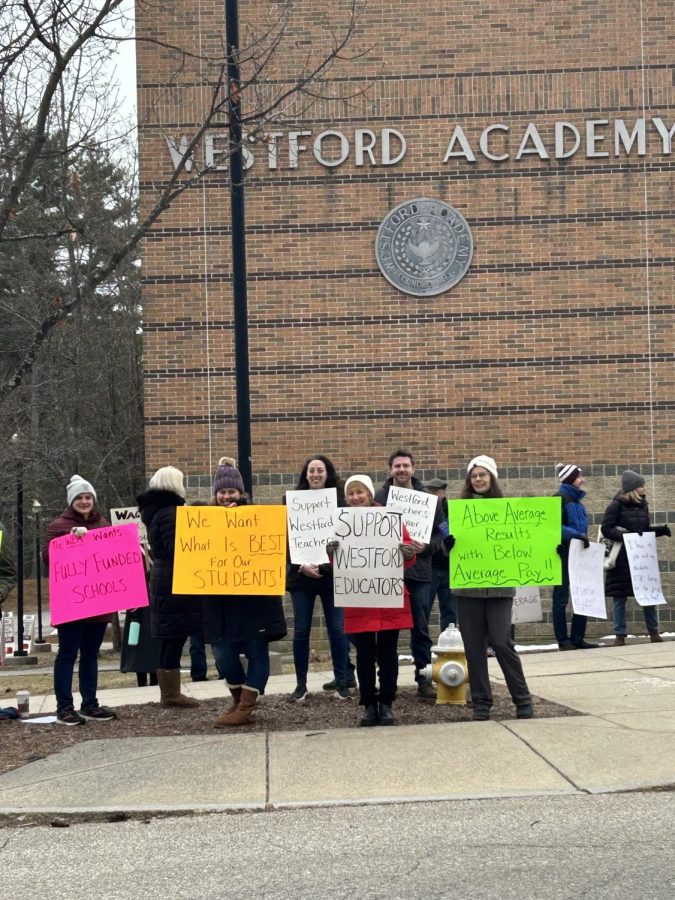“Above average results, below average pay;” why our educators deserve better
Sign stating “students and staff deserve better”, held by WEA President Kristine Jussaume.
April 6, 2023
It goes without saying that teachers are the backbone of any student’s education. From kindergarten all the way to graduation day, teachers support us from their classrooms. Whether it is staying after school, coaching sports, or advising clubs, their dedication is what sets up students for success. And although no one seems to dispute the hard work of teachers, their efforts still tend to go unappreciated. It is for this reason that over the past few months, waves of teachers across the country have gone on strike, demanding changes to an educational system that is in dire need of repair.
Just last week, thousands of teachers from the Los Angeles Unified School District went on strike, seeking pay increases. In Massachusetts alone, there have been three teacher strikes since last fall, with educators in Malden, Haverhill, and Woburn protesting against underfunded schools and inadequate pay.
A glimpse of this movement was seen in Westford when dozens of educators from the Westford Public Schools system stood outside the Annual Town Meeting on March 25, signs of protest and pamphlets in hand. And although the crowd was composed of everyone from teaching assistants and school nurses to high school teachers, their purpose was the same: advocating against years of inadequate funding and pay.In any case, the message is clear. Teachers are taking a stand, and whether it’s across the country or here in Westford, it’s time for us to listen.
This is nothing new. Since 2001, the country has seen a 19% decrease in the number of students with a bachelor’s degree in education, with less willing to work as teachers, given stressful working conditions and inadequate salaries. Recently, this growing decline of the field has only been exacerbated in light of COVID-19 disruptions and economic difficulties, with nearly 44% of public schools reporting at least one teaching vacancy. The lack of quality teachers threatens to damage America’s public education system, inflicting long term consequences to teachers and students alike.
One of the most pressing reasons for this growing shortage, and one that Westford is currently facing, is a lack of funding towards educator salaries. In negotiating a new three-year contract for 2023 and beyond with the town, the Westford Education Association (WEA) has expressed several concerns when it comes to to teacher salaries.
According to the WEA, teachers and nurses in Westford are paid 5% less than teachers in similar districts, such as Needham and Wellesley. Additionally, the maximum salary for a teaching assistant (TA) in Westford is about $25,000 a year, while the average living wage in Middlesex County for an adult with no children is nearly double, at around $40,000. This will, in the end, hurt not only our teachers but the school district as well—if salaries are so low, educators will be less inclined to teach here.
Similarly, another major concern has been the cost-of-living adjustment for salaries (COLA), which is meant to counteract the impact of inflation. According to the WEA, the currently offered COLA, which is less than 2.5% for teachers, counselors, and nurses, is not a sufficient raise when considering the current living wage and the competitive salaries of other districts.
For a town that takes pride in its high-performing schools, these statistics reveal a less favorable reality for the educators behind the rankings: how can we expect to maintain a high achieving district with underfunded teachers and schools?
Whether they are TAs, nurses, or teachers, each play a critical role in a students’ education. As a student, I have seen how great teachers have the capacity to change lives and encourage success in a way that others cannot. As someone who has family members working within the education field, I’ve also seen the long hours that go into grading, planning lessons, and genuinely caring about their students, both inside and outside the classroom.
Yet, despite low salaries, constant pressure, and possible burnout, our TA’s, nurses, and teachers embrace the hard work, citing their students as motivation. Paying our teachers living wages—and in doing so, acknowledging their hard work—should be a priority. Not only do better wages result in a more desirable position, but have also proven to produce higher quality teachers, and even a 5% to 10% increase in student performance. With all the time and effort teachers constantly sacrifice in the best interest of their students, expecting almost nothing in return, a living wage should be the least we do.
The consequences of this far-reaching issue are not only unfair to educators, but students’ learning opportunities as well. According to the WEA, these have included the lack of digital learning specialists in elementary schools, reduced field trips, a lack of a pre-first program, and reductions in teacher supply budgets. Many of these examples are essential components to enriching students’ education, something that should be prioritized in a town like Westford.
To add on, during the fiscal year 2021, Westford’s per pupil expenditure was $16,256, which is almost $2,200 less than comparable districts. Although budget cuts are inevitable, the way our funds are allocated also reveals where our priorities lie. And in a town where families come ready to invest in their child’s education, the lack of funds towards our schools and staff seems rather ironic.
At the same time, balancing the constraints and limits of the town budget and keeping pace with comparable districts is admittedly a complex task. In a statement released by the School Committee regarding ongoing negotiations with the WEA, it was shared that, although the town aims to support its educators and reach a mutually beneficial contract, it is not possible in the current operating budget for the Westford Public Schools to accommodate certain salary increases.
Amidst this ongoing debate over the contract, it is clear that there is no easy nor immediate solution. But acknowledging the hard work of our teachers as Westford gains a glimpse into the nationwide teacher crisis is crucial for the future of education throughout the country. On the local level, supporting this movement may start with becoming more involved within the town budget process, whether that means tuning in to school committee meetings or voting during the annual town meeting. Bringing attention to this issue, voicing support, and signing WEA petitions are all ways to make it clear that schools and educators deserve to be a priority. As residents, students, and parents, it is our job to speak out and support the educators who have supported us for so long.



















Lisa O'Donnell • Apr 7, 2023 at 10:18 pm
Well said., Deepa. A quality school system is a substantial contributor to maintaining property values in a community. Perhaps people will rethink the budget priorities when the town becomes less attractive to potential buyers and as a result, businesses. Especially in a post-COVID world, in which people can live anywhere and work remotely. the sshool district becomes a major consideration for families. With so many qualified teachers leaving the profession, and so few energetic and bright young people deciding against enteriing, districts that pay well will draw the good ones. So far, Westford has maintained its good reputation, but it these competitive times, it cannot continue to rely on the charity of the fine staff it was lucky enough to attract in the past.